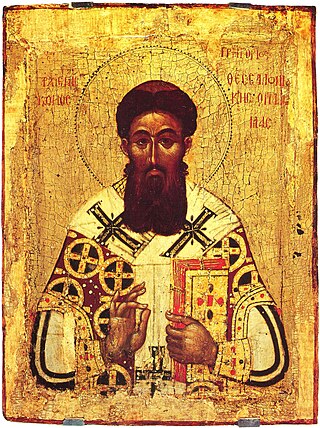
Hesychasm is a mystical tradition of contemplative prayer in the Eastern Orthodox Church. Referring to Jesus's injunction in the Gospel of Matthew 6:6 that "whenever you pray, go into your room and shut the door and pray to your Father who is in secret; and your Father who sees in secret will reward you", hesychasm is the process of retiring inward by ceasing to register the senses, in order to attain a mental state interpreted as an experiential knowledge of God.

Transcendental Meditation (TM) is a form of silent mantra meditation advocated by the Transcendental Meditation movement. Maharishi Mahesh Yogi created the technique in India in the mid-1950s. Advocates of TM claim that the technique promotes a state of relaxed awareness, stress relief, and access to higher states of consciousness, as well as physiological benefits such as reducing the risk of heart disease and high blood pressure.
Theurgy describes the practice of rituals, sometimes seen as magical in nature, performed with the intention of invoking the action or evoking the presence of one or more deities, especially with the goal of achieving henosis and perfecting oneself.

Unity, known informally as Unity Church, is an organization founded by Charles and Myrtle Fillmore in 1889. It grew out of Transcendentalism and became part of the New Thought movement. Unity is known for its Daily Word devotional publication. Unity describes itself as "for people who might call themselves spiritual but not religious."
A Christian Science practitioner is an individual who prays for others according to the teachings of Christian Science. Treatment is non-medical, rather it is based on the Bible and the Christian Science textbook, Science and Health with Key to the Scriptures (1875) by Mary Baker Eddy (1821–1910), who said she discovered Christian Science in 1866 and founded the Christian Science church in 1879. According to the church, Christian Science practitioners address physical conditions, as well as relationship or financial difficulties and any other problem or crisis. Despite the non-medical nature of their practice, Christian Science practitioners were aggressively prosecuted in the late 19th century by newly established state medical societies across the United States. Most state courts dismissed these actions because the courts ruled that they did not practice medicine. Practitioners are either "listed" or "unlisted," a designation that refers to a form of international accreditation maintained by The Mother Church, in Boston, Massachusetts. "Listed" practitioners are included in the directory of Christian Science practitioners on the church website, and printed in the Christian Science Journal.

Christian mysticism is the tradition of mystical practices and mystical theology within Christianity which "concerns the preparation [of the person] for, the consciousness of, and the effect of [...] a direct and transformative presence of God" or Divine love. In the words 1 John 4:16: "God is love, and he who abides in love abides in God and God in him."
Ernest Shurtleff Holmes was an American New Thought writer, teacher, and leader. He was the founder of a spiritual movement known as Religious Science, part of the greater New Thought movement, whose spiritual philosophy is known as "The Science of Mind." He was the author of The Science of Mind and numerous other metaphysical books, and the founder of Science of Mind magazine, in continuous publication since 1927. His books remain in print, and the principles he taught as "Science of Mind" have inspired and influenced many generations of metaphysical students and teachers. Holmes had previously studied another New Thought teaching, Divine Science, and was an ordained Divine Science Minister. His influence beyond New Thought can be seen in the self-help movement.

The Religious Science movement, or Science of Mind, was established in 1927 by Ernest Holmes (1887–1960) and is a spiritual, philosophical and metaphysical religious movement within the New Thought movement. In general, the term "Science of Mind" applies to the teachings, while the term "Religious Science" applies to the organizations. However, adherents often use the terms interchangeably.

Japa is the meditative repetition of a mantra or a divine name. It is a practice found in Hinduism, Jainism, Sikhism, and Buddhism, with parallels found in other religions.
The New Thought movement is a spiritual movement that coalesced in the United States in the early 19th century. New Thought was seen by its adherents as succeeding "ancient thought", accumulated wisdom and philosophy from a variety of origins, such as Ancient Greek, Roman, Egyptian, Chinese, Taoist, Vedic, Hindu, and Buddhist cultures and their related belief systems, primarily regarding the interaction between thought, belief, consciousness in the human mind, and the effects of these within and beyond the human mind. Though no direct line of transmission is traceable, many adherents to New Thought in the 19th and 20th centuries claimed to be direct descendants from those systems.

Emma Curtis Hopkins was an American spiritual teacher and leader. She was involved in organizing the New Thought movement and was a primary theologian, teacher, writer, feminist, mystic, and healer, who ordained hundreds of people, including women, at what she named the Christian Science Theological Seminary of Chicago. Emma Curtis Hopkins was called the "teacher of teachers" because a number of her students went on to found their own churches or to become prominent in the New Thought Movement.
This is a glossary of spirituality-related terms. Spirituality is closely linked to religion.
Joel Solomon Goldsmith was an American spiritual author, teacher, spiritual healer, and modern-day mystic. He founded The Infinite Way movement.

Joseph Denis Murphy was an Irish author and New Thought minister, ordained in Divine Science and Religious Science.
Affirmative prayer is a form of prayer or a metaphysical technique that is focused on a positive outcome rather than a negative situation. For instance, a person who is experiencing some form of illness would focus the prayer on the desired state of perfect health and affirm this desired intention "as if already happened" rather than identifying the illness and then asking God for help to eliminate it.

Christian contemplation, from contemplatio, refers to several Christian practices which aim at "looking at", "gazing at", "being aware of" God or the Divine. It includes several practices and theological concepts, and until the sixth century the practice of what is now called mysticism was referred to by the term contemplatio, c.q. theoria.

Mysticism is popularly known as becoming one with God or the Absolute, but may refer to any kind of ecstasy or altered state of consciousness which is given a religious or spiritual meaning. It may also refer to the attainment of insight in ultimate or hidden truths, and to human transformation supported by various practices and experiences.
Fenwicke Lindsay Holmes (1883–1973) was an American author, former Congregational minister, and Religious Science leader. The brother of Ernest Holmes, Fenwicke is widely recognized for being an important factor in the establishment of Religious Science and the founding of the United Centers for Spiritual Living. Fenwicke is recognized as an important figure in the development of the New Thought movement in Japan in particular Seicho-no-Ie.
This is a glossary of terms used in New Thought.










